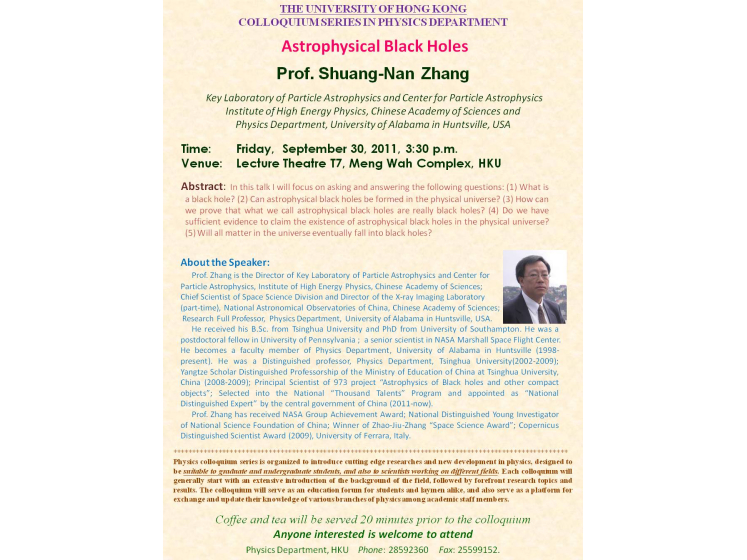Abstract:
In this talk I will focus on asking and answering the following questions: (1) What is a black hole? (2) Can astrophysical black holes be formed in the physical universe? (3) How can we prove that what we call astrophysical black holes are really black holes? (4) Do we have sufficient evidence to claim the existence of astrophysical black holes in the physical universe? (5) Will all matter in the universe eventually fall into black holes?
About the Speaker:
Prof. Zhang is the Director of Key Laboratory of Particle Astrophysics and Center for Particle Astrophysics, Institute of High Energy Physics, Chinese Academy of Sciences; Chief Scientist of Space Science Division and Director of the X-ray Imaging Laboratory (part-time), National Astronomical Observatories of China, Chinese Academy of Sciences; Research Full Professor, Physics Department, University of Alabama in Huntsville, USA.
He received his B.Sc. from Tsinghua University and PhD from University of Southampton. He was a postdoctoral fellow in University of Pennsylvania ; a senior scientist in NASA Marshall Space Flight Center. He becomes a faculty member of Physics Department, University of Alabama in Huntsville (1998-present). He was a Distinguished professor, Physics Department, Tsinghua University(2002-2009); Yangtze Scholar Distinguished Professorship of the Ministry of Education of China at Tsinghua University, China (2008-2009); Principal Scientist of 973 project “Astrophysics of Black holes and other compact objects”; Selected into the National “Thousand Talents” Program and appointed as “National Distinguished Expert” by the central government of China (2011-now).
Prof. Zhang has received NASA Group Achievement Award; National Distinguished Young Investigator of National Science Foundation of China; Winner of Zhao-Jiu-Zhang “Space Science Award”; Copernicus Distinguished Scientist Award (2009), University of Ferrara, Italy.
******************************************************************************************************
Physics colloquium series is organized to introduce cutting edge researches and new development in physics, designed to be suitable to graduate and undergraduate students, and also to scientists working on different fields. Each colloquium will generally start with an extensive introduction of the background of the field, followed by forefront research topics and results. The colloquium will serve as an education forum for students and laymen alike, and also serve as a platform for exchange and update their knowledge of various branches of physics among academic staff members.





